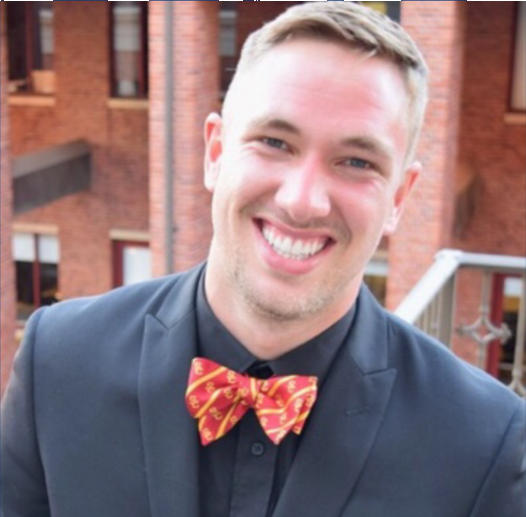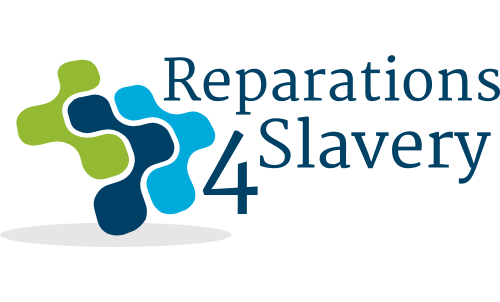Interview with David Gardinier

David Gardinier is a founding member of The Fund for Reparations NOW! (FFRN!) FFRN! was launched in 2019 to commemorate the 400th anniversary of the first enslaved Africans arriving in Jamestown, Virginia, and to imagine the future America in which reparations are a reality and deeper racial healing is possible. The Fund is administered and financed by its board, the nationwide white American arm of NAARC, who are committed to our collective liberation, and to supporting the vision of NAARC’s African American leadership.
R4S: David, how did you get involved in the reparations movement?
David: Well, I first became aware of systemic racism in college. I would encounter one form of racism after another: housing inequality, mass incarceration, problems in healthcare. Lots of people were talking about these problems but they weren’t talking about solutions. So, the minute that I heard about reparations as a concept, I had this strong sense of calling. I knew that this was what my life was going to be about. It took me a while to live into that, but The Fund for Reparations NOW! is my first step in that direction.
R4S: As a child, what were your first impressions of people of other races?
David: I grew up in Spokane, Washington, which is 92% white, in a very conservative evangelical household. It was very insular. For example, I was homeschooled so that I wouldn't learn about evolution. So, I had very little exposure to people who looked different than me in the beginning.
In fact, I have a terrible story to tell, one that has haunted me for a long time. I’ve only recently been able to speak about this.
So, I was five years old – this is back in Spokane – standing in my living room and there was this Black woman walking down the sidewalk in front of my house. I asked my mom, “Why does she look like that, what's wrong with her?” My mom gave a “good” response, something like, “Oh honey, that's how God made her.” So, I heard what my mom said, I took it in, and the next thing that came out of my mouth was, "She is ugly."
You know, I've spent a lot of my life asking, "what kind of little prick would say something like that?" It wasn't until two or three years ago, after I'd been studying structures of institutional racism, that I came to understand that I was racist before I had a choice not to be. We all are, it’s in the culture, its invisible. I mean, think about it, I’m only 5 years old and already European standards of beauty have been implanted in my mind. I even Googled 90s beauty ads and sure enough, the models are all white. Essentially, I'd already been trained to say that she was ugly, to absorb messaging about white supremacy.
“I am working to build a healthy anti-racist white identity both within myself, and with the white people in my community, and it is this vision that led me to found The Fund for Reparations NOW! I come from Spokane, WA, but I now live in Los Angeles, CA where I am an active member of the Alliance of White Anti-Racists Everywhere (AWARE) – LA. Over the years, I have come to see reparations work as my highest calling, and I am eager to see payment of formal reparations to African Americans within my lifetime.” David Gardinier
That was my first experience of noticing race and it's not one I'm proud of. However, it has propelled me into action, to interrogate my beliefs, my thoughts, and my actions, to continually look for the ways that that myth shows up. I find evidence of my conditioning every day, so I work to weed it out and replace it with the truth. Ultimately, there is a lot of humility that goes with this work. As I always say, “I’m a work in progress.”
R4S: Once you set out on this path, how did you end up collaborating with NAARC? What about NAARC’s mission attracted you?
David: Naysayers always cite how complicated the idea of reparations is to dismiss the idea. NAARC’s 10-point plan seemed very tangible to me. I was really inspired by it. So, I ended up reaching out to them. I asked them, “If I wrote a proposal, would you even want to read it?” I was surprised by their “yes” answer, so I spent a month or so coming up with the proposal and they decided they wanted to move forward. Ultimately, I said, “Here, you shape this fund into what you want it to look like and I'll go get the white people.”
“We commend David and the group he has organized for launching this powerful initiative. It has the potential for creating a vehicle for thousands, if not millions, of white Americans to participate in the process of repairing the harm inflicted on people of African descent by enslavement and post-emancipation racially exclusionary policies and practices.” - Dr. Ron Daniels, Convener, National African American Reparations Commission (NAARC)
We started small, but we’ve expanded to six white board members now. These are people who have seen the fund, been inspired, and wanted to have greater involvement than just contributing to the fund. So many white people are ready to move forward. A lot of us are disparate and don't know about each other, so, beyond fundraising, finding community has been one of the best things about starting the fund so far.
R4S: How did you and the white FFRN! board members build trust with NAARC’s board?
David: NAARC has communicated their vision and ideals and provided direction for how they want us to move forward. They have also given us a lot of freedom to express ourselves and to pursue our own ideas, so it’s truly a collaboration between us. We have autonomy but also the accountability piece that is so important.
R4S: Can you describe NAARC's 10-point plan?
David: NAARC’s 10-point plan is focused on a wide-ranging set of projects to benefit the African American community, rather than just cutting checks to individuals.
- A Formal Apology and Establishment of a MAAFA*/African Holocaust Institute (Kiswahili term for “terrible occurrence” or “great disaster”)
- The Right of Repatriation and Creation of an African Knowledge Program
- The Right to Land for Social and Economic Development
- Funds for Cooperative Enterprises and Socially Responsible Entrepreneurial Development
- Resources for the Health, Wellness and Healing of Black Families and Communities
- Education for Community Development and Empowerment
- Affordable Housing for Healthy Black Communities and Wealth Generation
- Strengthening Black America’s Information and Communications Infrastructure
- Preserving Black Sacred Sites and Monuments
- Repairing the Damages of the “Criminal Injustice System”
Regarding funding, I am hyper-aware of the way white supremacy shows up in nonprofit organizations and philanthropy, with white folks saying, “This is what you should be doing, and we'll fund it, but only if you do all of this reporting and jump through these hoops.” So, we were very careful to design our fund in a way that cuts as much of that out as possible. Ultimately, I think it’s so important for white people to follow Black leadership around reparations.
R4S: Still, the 10-point plan is enormous. Is there a strategic implementation plan? What projects will NAARC launch first?
David: There are two perspectives to look at: what can be funded now, at the grassroots level, and what can be funded later, at the federal level once reparations are implemented nationally.
At the grassroots level, NAARC has chosen to focus on point 9, the preservation of Black sacred sites and monuments. The plan is to collect funds for about a year and then see which projects can be undertaken.
“…Black Sacred Sites and Monuments must be preserved as permanent memorials to continuously inform and inspire future generations of people of African descent about this legacy of trials, tribulations and triumph and to remind America of the white supremacist terror employed to obstruct the path to freedom of African Americans.” NAARC
At the federal level, NAARC is working with Representative Sheila Jackson Lee, the current sponsor for HR 40. When HR 40 passes and the commission studying reparations is created, NAARC hopes that the 10-point plan will serve as a guide for the commission.
R4S: What challenges do you face going forward?
David: Getting white folks to understand why they should support reparations is a challenge. But that’s changing. The more people understand how we’ve benefited from the system of slavery and institutional racism, the more support we’ve garnered. I focus on getting folks to see the through-line from enslavement to the present day, how the structures of racism have morphed over time.
Also, we agree that reparations are due for more than just enslavement: red-lining, mass incarceration, all these injustices deserve reparations in and of themselves. The need goes so much deeper, is so much broader than we typically understand.
R4S: If there is an equitable future for all of us, what does that look like for you as a white male?
David: Yesterday I was hanging out with some colleagues of mine, both Black women. We all used to work for the same organization. Listening to them talk about their day to day, it really hit me, how hard they worked and how I got to skate by.
You know, there's a real spiritual awakening that’s necessary before we can achieve equity. We white males will have to face ourselves, to do the deep introspective work necessary to be in touch with our own humanity and to see the humanity in everybody else.
In an equitable future there would be equality of opportunity, everybody having the same shot that I do. Currently, because of systemic racism, competition has been squelched. That means in many ways I've only been competing with other white people and not the entire universe of qualified people. In an equitable future, everyone would have an equal chance at being Einstein. And that means that Black people will not have to work 10 times harder than I do to succeed. In fact, I'll have to work harder to compete. As I see it, this is all part of reparations, part of the path to liberation.
Calling White Americans: Reparations For Slavery Are Due
WBAI: White progressives support reparations
National African American Reparations Commission
Micro-Reparations
What’s a micro-reparation? It’s the opposite of a micro-aggression: a simple way for white people to show solidarity and advocate for the well-being of African Americans, while we all work to effect long term social change.
Provide Support for National Reparations Campaigns:
Fund For Reparations NOW! – FFRN! is the white ally initiative of NAARC
National African American Reparations Commission – united in a common commitment to fight for reparatory justice, compensation and restoration of African American communities
